The Horizons team features many influential Twitter users. This curates a wealth of insights, knowledge, and information about transformation in health and care from other thought leaders across the world. (Tip: to read an article or watch a video mentioned in a tweet, click on the blue text. To view the original tweet, click on the image).
The School for Change Agents
Big shout out to amazing change agents Lucy Chalkley for sharing her personal narrative after watching session four of #S4CA, thank you Lucy!

This week, we hosted our second LIVE session. If you missed it, don't worry you can watch the recording and read the tweet thread below. Next Tuesday will be our final live session.

If you are joining school through FutureLearn or you'd like to hear more about making change in the NHS have a listen to our Agents Assemble podcast below! In this session hear from Helen, Kerry, Olly, Leigh and Zarah!
You can also still sign up for School.

#OurNHSPeople
Looking after #OurNHSPeople is key for ensuring we create the right conditions for people. This week Ian, Rupal and Bev supported #SWPeople for their launch event. Find out how it went through the tweet thread below!

#VirtualCollaborate
Sharing and learning together is key to our approach for #VirtualCollaborate This thread by Tessa Davis shares some fabulous tips for running successful online events #VirtualCollaborate.
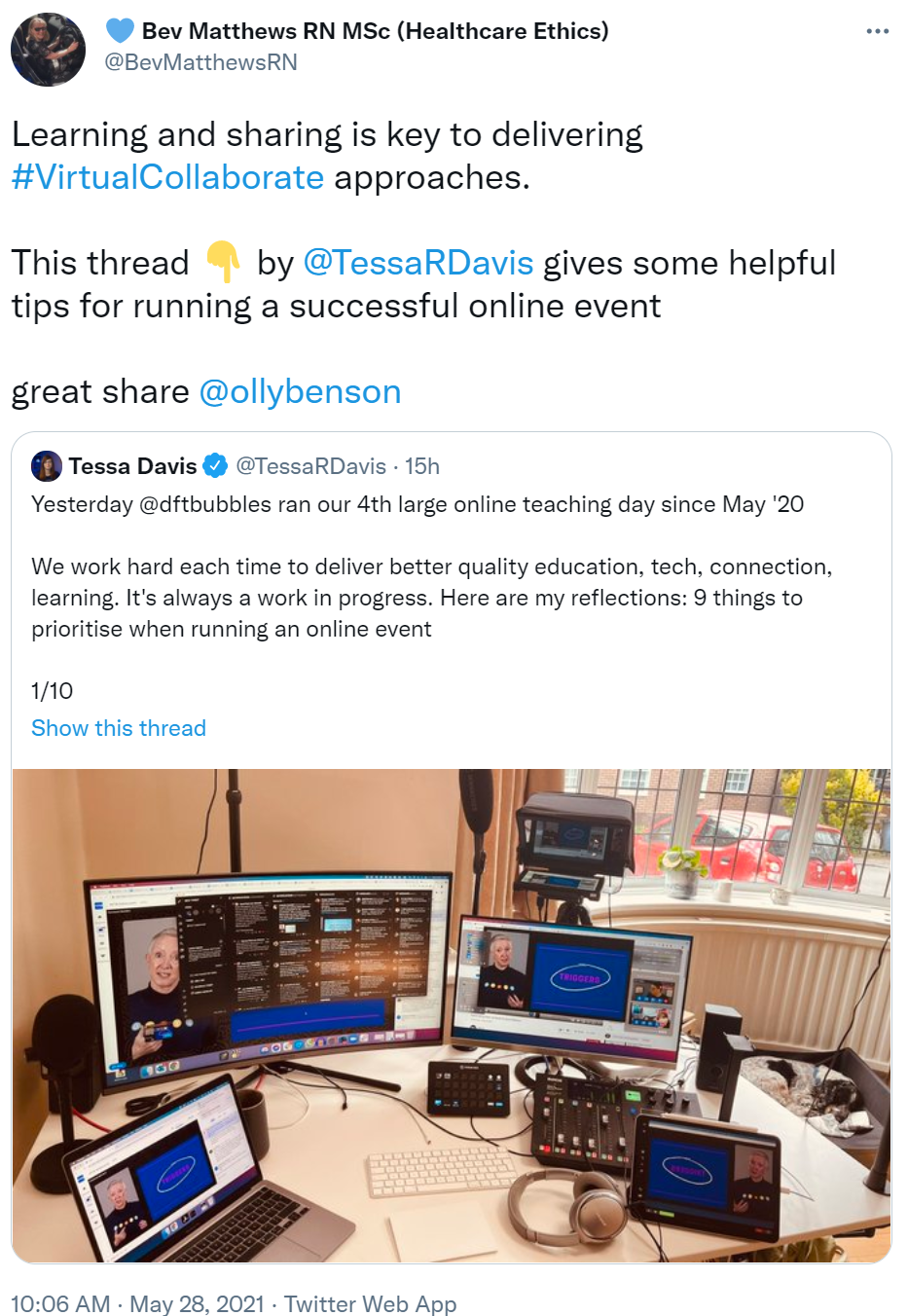
As we move to more "hybrid" working (some days in the office, some based at home),a research-based case for why everyone should be in the office on the same days. Two reasons: 1) avoiding "in" and "out" groups in the team; 2) risk to diversity.

COVID19 and Recovery
As we move to a world beyond the pandemic, many things are changing in our lives and our work and may never been the same again. It's not just our organisations & systems that need to grow from change. We need to as well. Some great advice from Julie Woodard


We're in such a strange place currently. We can be hopeful we are emerging from lockdown, yet so many aspects of the future seem uncertain. Lots of people are saying they are feeling a bit lost. Maybe we should listen to Sherrill Knezel and understand this might not be a bad thing.


At this strange time that isn't quite post-pandemic, everyone seems so busy, emotions are amplified & remote working continues to blunt connection. Now, more than ever, we need to harness the power of emotions at work.

From Otto Scharmer, 10 lessons from Covid for the decade of transformation ahead. Change beyond the pandemic isn’t just about changing social structures but about shifting human consciousness to operate from a deep sense of purpose:
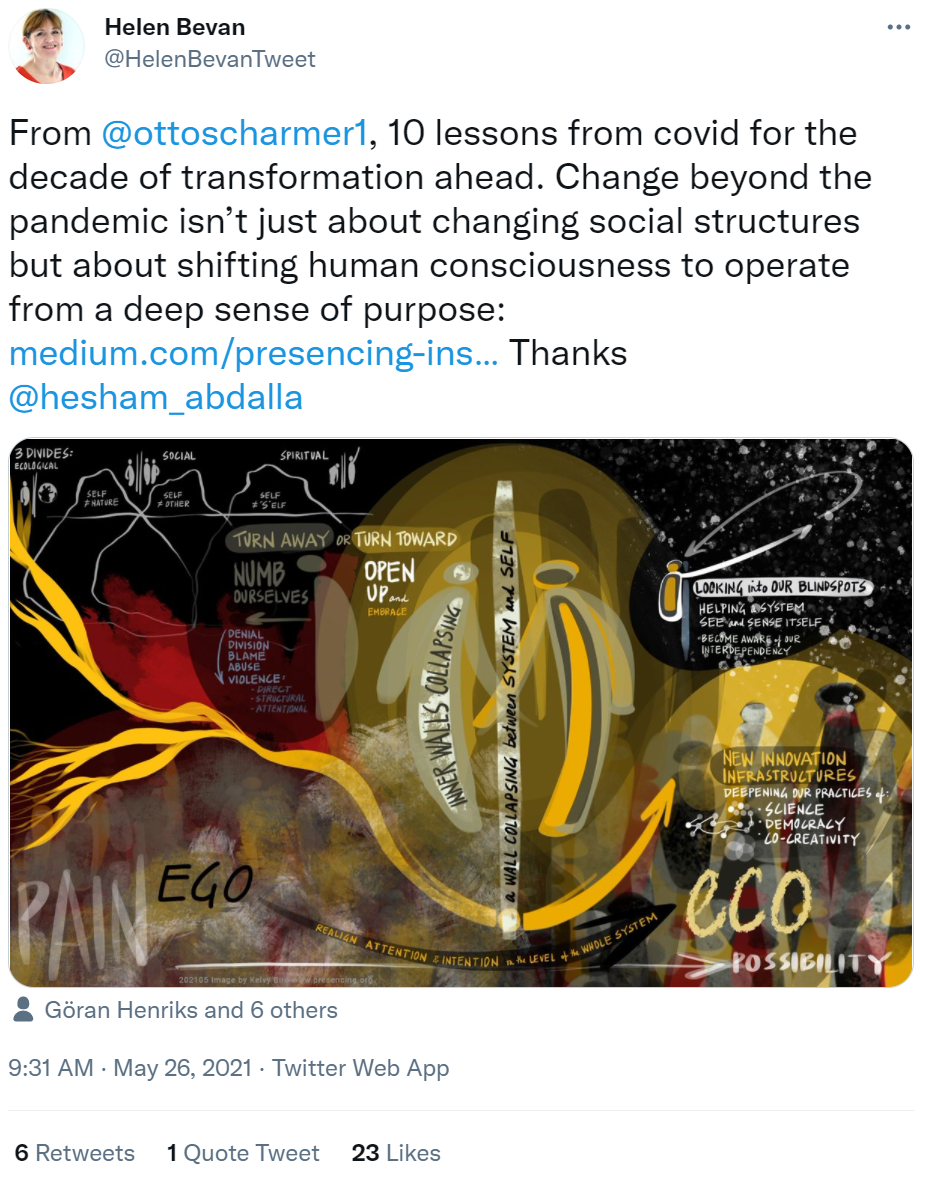
Leadership and Teams
The traditional role of mid-level managers (monitoring productivity, performance, etc) is shifting. Instead of being stuck in the middle, the role's evolving to building teams and connecting the people who are the lifeblood of the organisation.
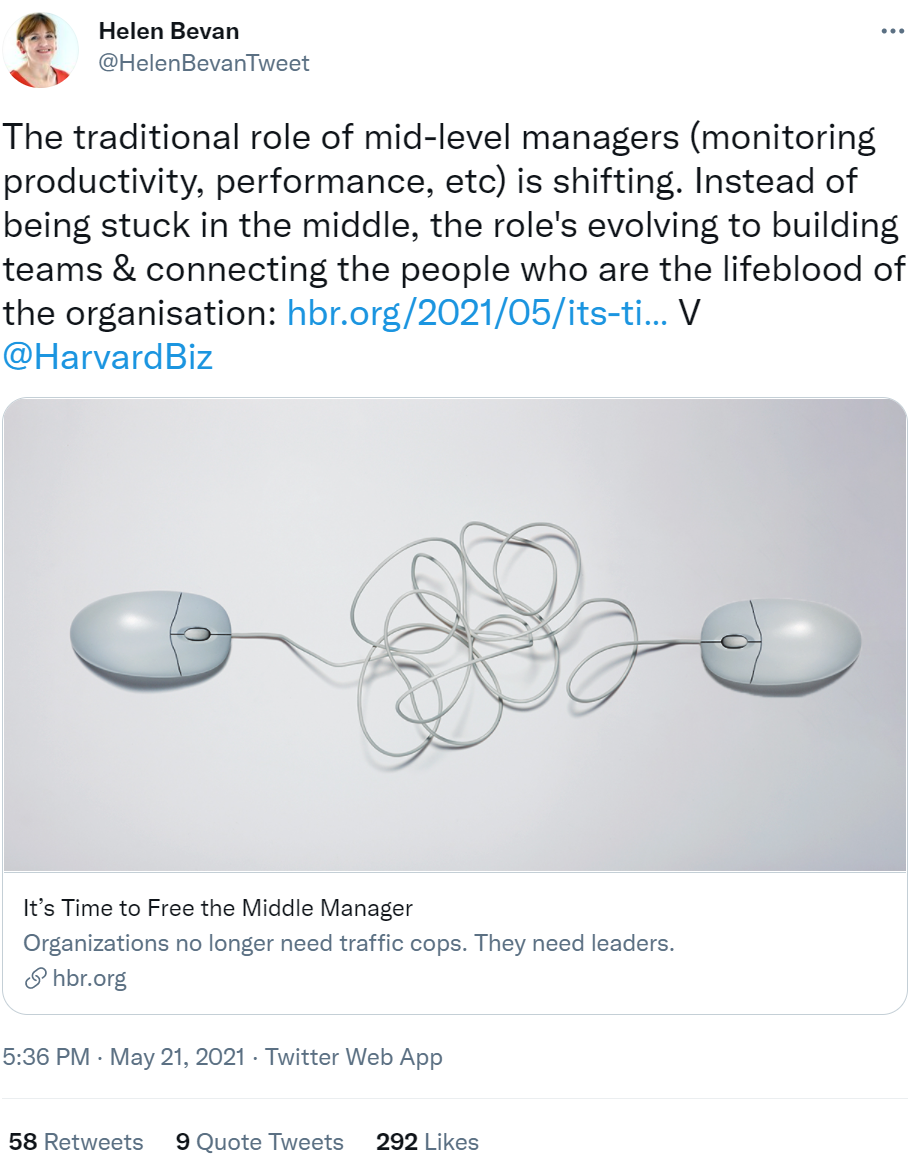
Leaders often talk about "top-down" & "bottom-up" change. In reality, it's more of a horizontal (alongside) than vertical (up or down) process. Change spreads person-to-person, side-by-side, through social connections.
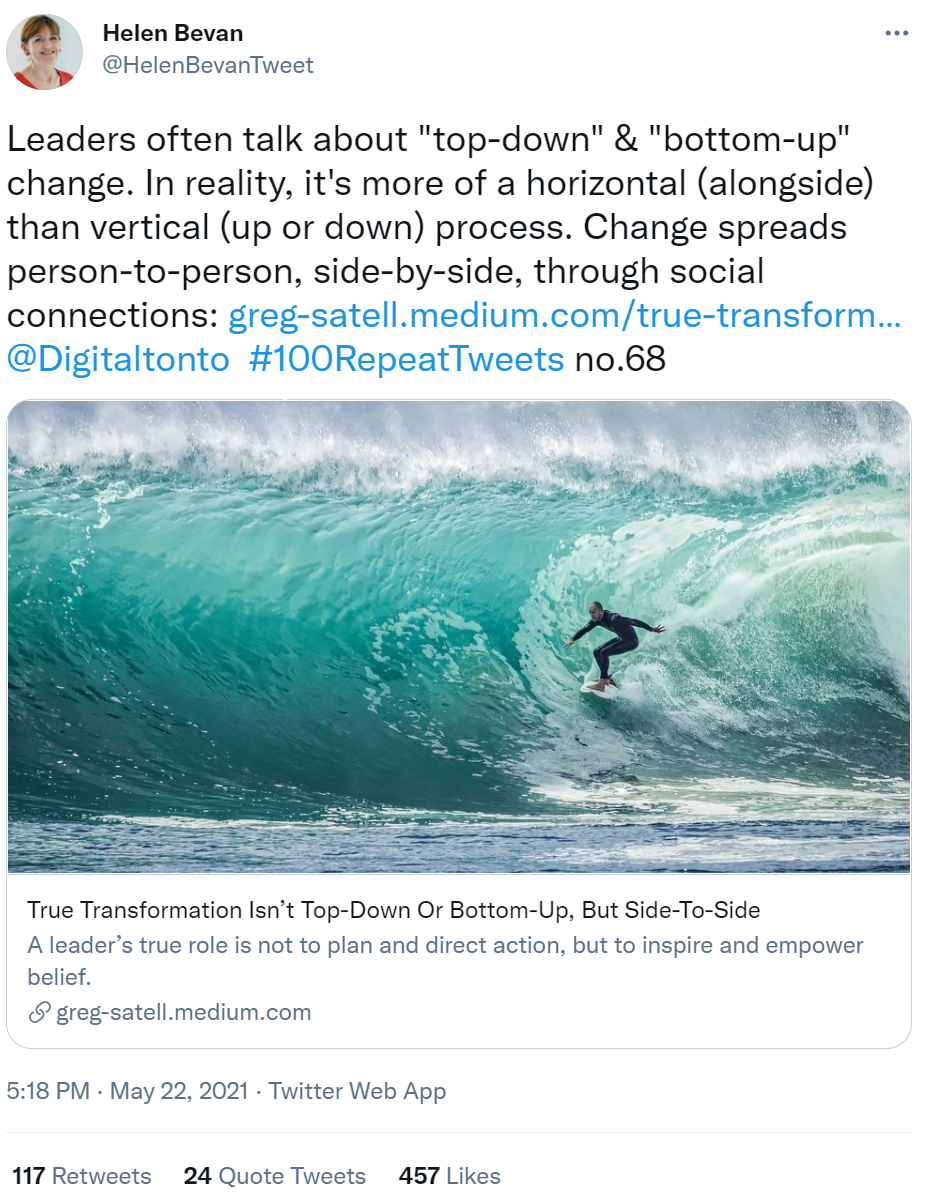
Too often, large scale change is seen as strategy & tactics by senior leaders, but no small group can drive change alone. It's why organisations with strong, trusting relationships are more likely to deliver transformational change.

This new framework for improving the experience of people at work, based on design thinking. The focus on reducing energy-sapping frustration stemming from internal systems & tools is something we often don't give enough attention to

People want to be treated like people. They don't want to be treated like workers or employees or human resources or widgets. Treat people like people & everyone benefits. 12 ways to do this by Wally Bock.
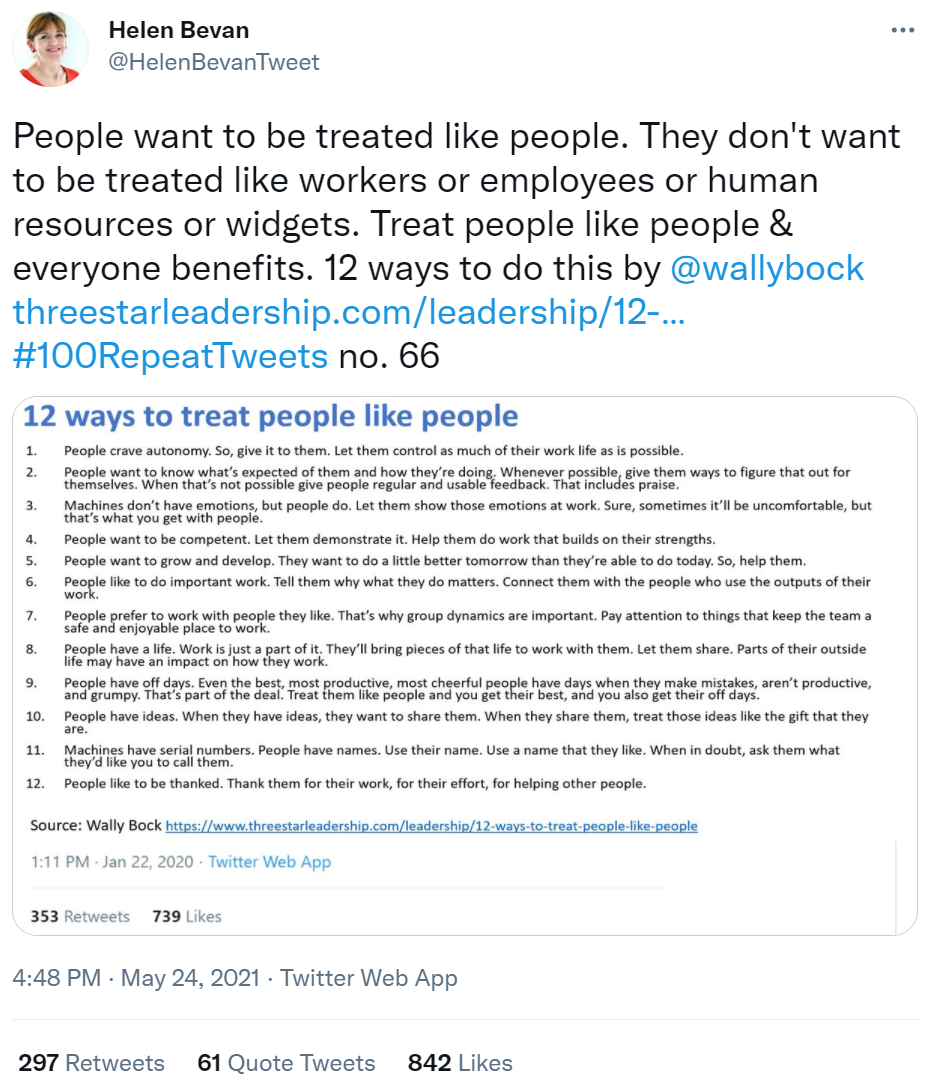
Research-based advice for leaders on building a growth mindset: 1) recognise & reward potential more than skills; 2) build high levels of trust in teams; 3) take people outside their comfort zone.
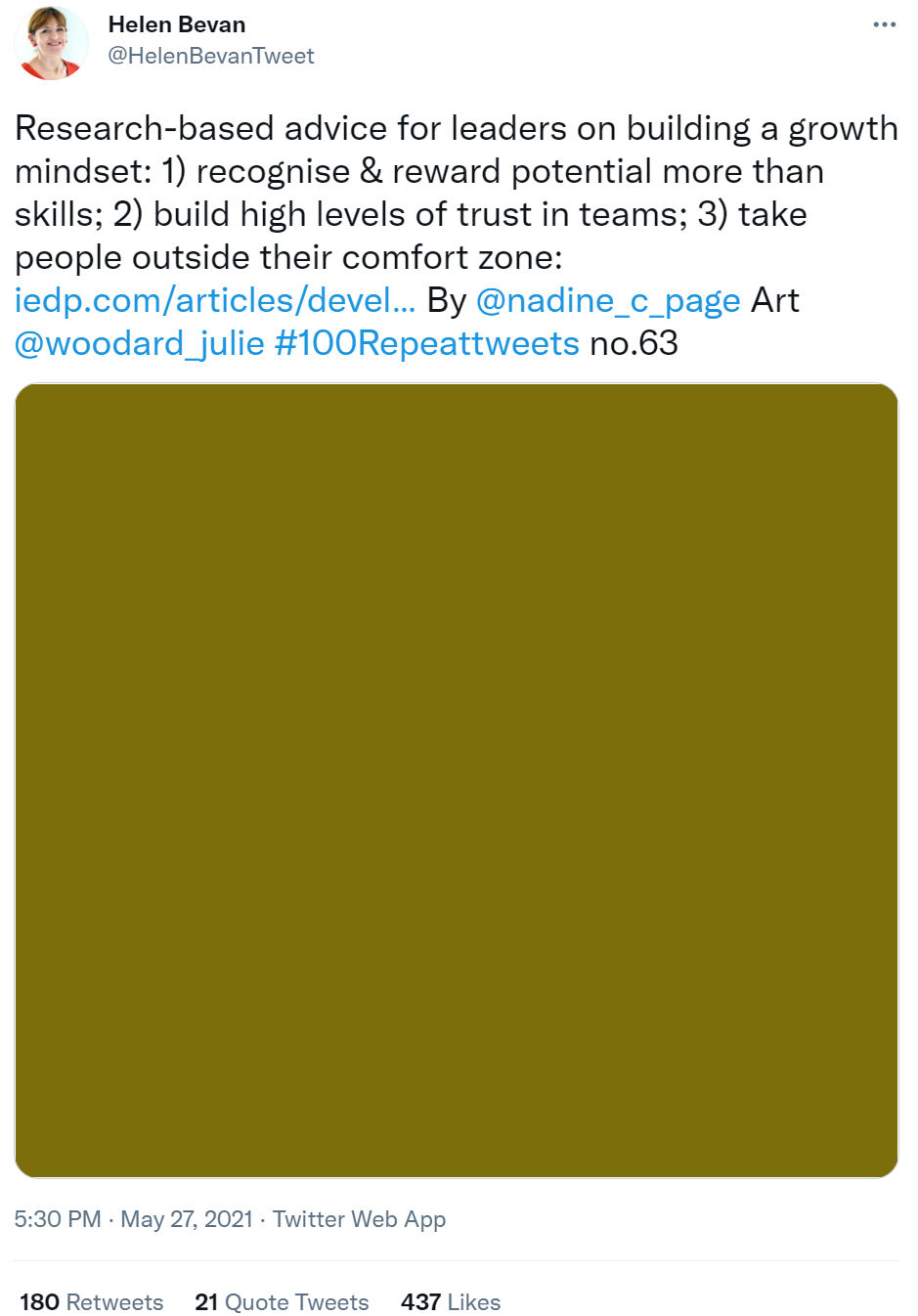
Innovation and Productivity
The paradox of productivity: Constant busyness makes us exhausted, inflexible & blinkered. According to multiple experts, we need be more like slackers in our working day - with space to absorb shocks or pivot quickly when things change.

The 70:20:10 innovation rule. Spend: 70% of time improving what you already do 20% applying what you're good at to other contexts 10% finding new problems to solve The 10% is the most neglected but creates the future

Helen's just been a learner in a @Sys_innovation session on using leverage points to decide where to intervene in a system to make the greatest gain. Appreciating @AnnasQuestions and her wisdom on leverage points for large scale change. Here's her latest article.




/Passle/5a5c5fb12a1ea2042466f05f/MediaLibrary/Images/6168334917af5b10f4bf1d30/2022-04-14-15-27-52-040-62583d78f636e9115805b2d5.png)
/Passle/5a5c5fb12a1ea2042466f05f/MediaLibrary/Images/6168334917af5b10f4bf1d30/2022-08-05-09-59-36-465-62ecea08f636e906acfed639.jpg)
/Passle/5a5c5fb12a1ea2042466f05f/MediaLibrary/Images/6168334917af5b10f4bf1d30/2022-07-28-14-57-17-405-62e2a3cdf636e9180c9835cb.png)
/Passle/5a5c5fb12a1ea2042466f05f/MediaLibrary/Images/6168334917af5b10f4bf1d30/2022-07-20-10-16-56-533-62d7d618f636ea07987f6668.png)
/Passle/5a5c5fb12a1ea2042466f05f/MediaLibrary/Images/6168334917af5b10f4bf1d30/2022-07-15-09-55-32-858-62d13994f636ea1398e71aa9.jpg)